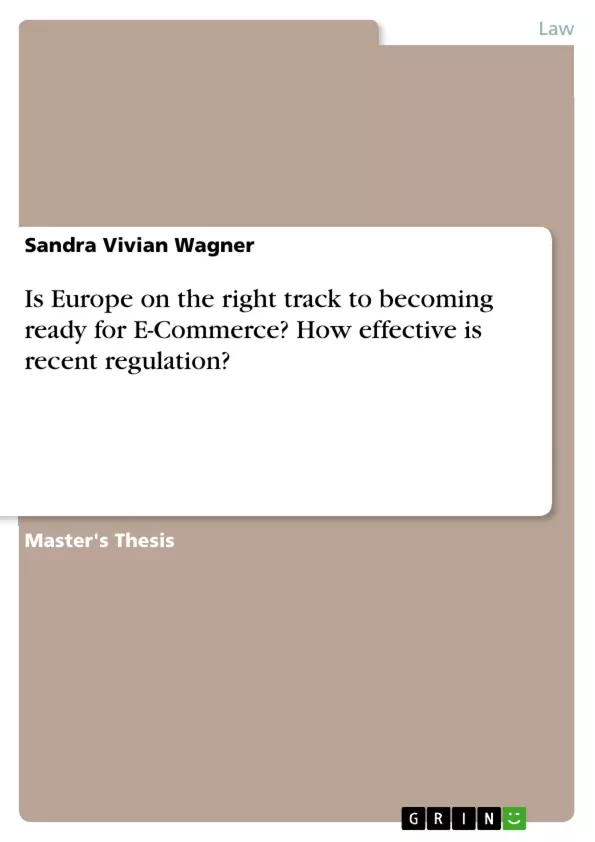This Dissertation aims to assess the effectiveness and suitability of European regulation in respect to E-Commerce.
Taking the European ‘Lisbon Strategy’ as set out in 2000 as a starting point, this paper examines whether Europe is on the right track to becoming “the most competitive and dynamic knowledge-based economy (…) by 2010”.
Hereby, the scope of this paper is limited to E-Commerce only as one essential part of a ‘knowledge-based economy’ and an ‘e-ready’ Europe.
After outlining the special nature of E-Commerce, the rationale behind regulation and the historical background of European regulation in this field, this paper concentrates on four issues where the EU has become active in regulating E-Commerce, namely, the essential prerequisite of an existing ‘e-infrastructure’, e-signatures, privacy and consumer protection.
The European approach to each of these issues is assessed to reveal its strengths and weaknesses. Moreover, this European way of regulating E-Commerce is then compared with other regulative attempts. Hereby, special attention is paid to the US approach to regulating E-Commerce which is mostly based on self-regulation.
Thus, this paper comes to the conclusion that Europe is on the right track to becoming ‘e-ready’ in respect to E-Commerce. Basic regulatory decisions have the potential to lead in the right direction, although they do not always provide the most effective solution.
Often European Directives do not reach far enough and are outdated. Thus, they do not address E-Commerce sufficiently, give too much discretion to the Member States and leave prevalent gaps or do not interoperate properly.
Therefore, the European regulation on E-Commerce needs some revision and has to take some brave and innovative steps to establish legal certainty, as well as to create consumer trust and confidence. Following this path active participation can be promoted and consequently, a vibrant E-Commerce market created.
Table of Contents
- I. INTRODUCTION
- II. OUTLINE
- III. BACKGROUND INFORMATION
- 1. What is E-Commerce and why is it special?
- 2. Why do we regulate?
- 3. The History of the EU Approach
- IV. ILLUSTRATIVE ISSUES OF REGULATION ON E-COMMERCE
- 1. E-Infrastructure
- a) The EU Policy
- b) Practical Implications
- c) Conclusion
- 2. Electronic Signatures
- a) The EU Policy
- (1) The E-Signatures Directive
- (2) The E-Commerce Directive
- b) Conclusion
- a) The EU Policy
- 3. Privacy Protection
- a) The Data Protection Directive
- b) The US Approach
- c) Resume
- d) Spam
- (1) The E-Communications Directive
- (2) The US Approach
- (3) 'Code' as an Alternative
- e) Conclusion
- 4. Consumer Protection
- a) The Distance Selling Directive
- b) Resume
- c) The E-Commerce Directive
- d) Comparison of the EU and the US Approach
- e) Conclusion
- 1. E-Infrastructure
- V. CONCLUSION
Objectives and Key Themes
This dissertation aims to evaluate the efficacy and suitability of European regulations concerning e-commerce. It examines whether Europe is on the right track to becoming "the most competitive and dynamic knowledge-based economy (...) by 2010"¹ by assessing the effectiveness of the European "Lisbon Strategy" for e-commerce.- The special nature of e-commerce and its regulatory challenges
- The rationale behind regulating e-commerce
- A historical overview of European e-commerce regulation
- The strengths and weaknesses of the European approach to regulating e-commerce
- A comparison of the European and US approaches to regulating e-commerce
Chapter Summaries
- Introduction: This chapter sets the stage for the dissertation, introducing the topic of e-commerce regulation in the European Union and its significance in achieving the goals outlined in the Lisbon Strategy.
- Outline: This chapter provides a roadmap for the dissertation, outlining the key issues and arguments to be explored in subsequent chapters.
- Background Information: This chapter delves into the foundations of e-commerce regulation, examining its unique characteristics, the rationale for regulation, and the historical development of European e-commerce regulation.
- Illustrative Issues of Regulation on E-Commerce: This chapter analyzes key issues of e-commerce regulation, including the importance of e-infrastructure, electronic signatures, privacy protection, and consumer protection. It examines the EU's approach to these issues and compares it to other regulatory models, particularly the US approach.
Keywords
The primary focus of this dissertation lies in assessing the effectiveness of European regulations in fostering a vibrant and competitive e-commerce environment. Key themes include e-commerce regulation, the Lisbon Strategy, e-infrastructure, electronic signatures, privacy protection, consumer protection, and a comparative analysis between European and US regulatory approaches. ¹ European Commission "The Lisbon Strategy" atFrequently Asked Questions
What is the main objective of this dissertation on E-Commerce?
The dissertation aims to evaluate the effectiveness and suitability of European regulations regarding e-commerce, specifically assessing if the 'Lisbon Strategy' is on track to making Europe a competitive knowledge-based economy.
Which four key regulatory issues are analyzed in the paper?
The paper concentrates on e-infrastructure, electronic signatures (e-signatures), privacy protection, and consumer protection within the European Union.
How does the European approach to E-Commerce regulation differ from the US?
While the European approach is based on formal Directives and regulation, the US approach is largely characterized by self-regulation and a different philosophy regarding privacy and consumer protection.
What are the identified weaknesses of current European e-commerce directives?
The author notes that many directives do not reach far enough, are outdated, leave significant legal gaps, and grant too much discretion to individual Member States, which hinders interoperability.
What steps are proposed to improve the European e-commerce market?
The paper suggests a revision of regulations to establish legal certainty, build consumer trust, and foster a more vibrant market through innovative and brave legislative steps.
- Citation du texte
- Sandra Vivian Wagner (Auteur), 2004, Is Europe on the right track to becoming ready for E-Commerce? How effective is recent regulation?, Munich, GRIN Verlag, https://www.grin.com/document/61016



